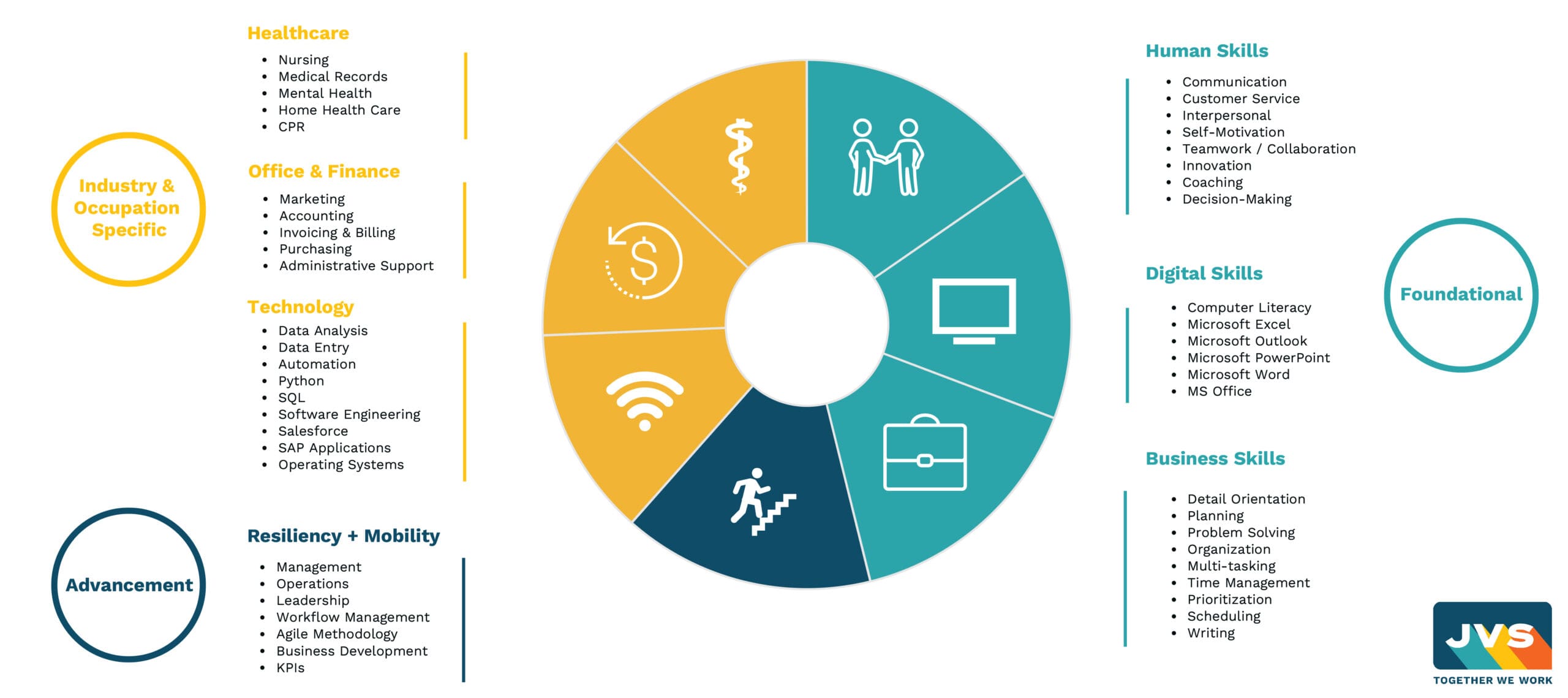Opportunities for Action
JFF and JVS recommend that employers take four steps to improve foundational skills training opportunities for employees: Use a social and emotional learning curriculum, partner with community-based organizations and other third-party training providers, embrace skills-based hiring practices, and invest time and other resources into all stages of the recruiting and hiring process. Here’s a look at each one of those steps in more detail.
1. Invest in a social and emotional learning curriculum to embed in your organization’s foundational skills training.
You may be familiar with training programs that focus on technical skills—everything from coding to graphic design to welding—but scratching your head when it comes to offering training that helps people improve human skills like relationship-building or decision-making capabilities.
One way to deliver that type of training is to offer courses that promote social and emotional learning. According to the Collaborative for Academic, Social and Emotional Learning (CASEL), social and emotional learning (SEL) is “the process through which all young people and adults acquire and apply the knowledge, skills, and attitudes to develop healthy identities, manage emotions and achieve personal and collective goals, feel and show empathy for others, establish and maintain supportive relationships, and make responsible and caring decisions.”
Fortunately, there are organizations that offer SEL courses, so you don’t have to start from scratch to embed an SEL curriculum into your existing workplace training programs.
For example, JVS has developed a curriculum called the EQ Suite to help people build emotional intelligence (EQ). Based on an SEL competency framework from CASEL that’s nationally recognized in childhood education and development, JVS’s workforce-related EQ Suite focuses on self-awareness, self-management, social awareness, and relationship management—all of which are essential skills that aren’t easily automated.
Another industry-recognized training provider, Imago, offers an online learning platform with an SEL curriculum. Imago partners with employers, schools, and workforce boards to offer video-based courses that prepare learners and workers to succeed in ever-changing workplaces by helping them develop skills in areas like adaptability, tenacity, and resilience.
2. Partner with local community-based organizations (CBO) and regional experts to inform and deliver foundational skills training.
JVS, like other CBOs, is deeply familiar with local and regional circumstances that affect workers’ abilities to succeed in a job. These place-based conditions can include access to essential services and resources like high-speed internet service, housing, food, child care, and transportation, as well as the interplay of race, class, power, and privilege. In areas where many workers face those types of challenges, employers can partner with CBOs like JVS to ensure that the foundational skills training they offer is culturally and socially responsive to the needs of the people who make up the regional workforce.
3. Adopt skills-based hiring practices to identify and hire for the foundational skills your company needs to stay competitive.
An increasing number of companies are embracing skills-based talent development practices and abandoning approaches in which they base decisions to hire or promote people on requirements like college degrees, previous job titles, and years of experience. Skills-based policies reward people based on their abilities—what they can do, not the degrees or other credentials they’ve earned—and expand internal advancement opportunities.
Skills-based approaches to talent management make it easier to identify workers who have the foundational skills that are essential to ongoing success in today’s economy. That information wouldn’t be readily apparent in a list of degrees or certificates on a resume.
JFF has collaborated with more than 100 employers that are implementing skills-based talent practices. Through that work, we have identified challenges that employers could face in making the change, along with promising strategies for overcoming those challenges. We drew on those insights and lessons learned to develop a resource we call an employer journey map that guides business leaders through the process of developing and implementing skills-based practices and offers an extensive list of useful resources.
4. Invest time and other resources into all stages of the talent acquisition process to develop a strong talent pipeline.
Many employers expect new hires to enter their workplaces already equipped with the skills they need, or else they focus on training employees only after they’ve been hired. But the reality is that workers will be better prepared to contribute on day one if employers are actively engaged in all pre-hire stages—from career exploration and training to the application and interview processes.
JVS has observed improved outcomes for both workers and employers when employers invest time and other resources early in the process. This includes offering paid work-based learning opportunities, allowing workers to build new skills on the job in a supportive environment, and providing feedback to training providers on their course offerings. It also includes employer participation in practice interviews, training for hiring managers, skills-based performance assessments, and more.
For example, JVS runs a clerical and administrative skills training program for people interested in jobs in the health care sector in partnership with the University of California, San Francisco (UCSF), and university staff are heavily involved in the learning activities, which include both on-the-job training and classroom instruction. Known as Excellence Through Community Engagement Learning (EXCEL), the program is designed to help strengthen the local workforce and build a talent pipeline for UCSF. After completing 10 weeks of training, participants are placed in four-month paid internships at the university. UCSF staff host work-based-learning experiences, teach classes, participate in mock interviews, and provide coaching to participants, ensuring that learners will know what to expect in their jobs and will feel invested in and welcome in what could be an intimidating environment at a high-profile employer.
That kind of ecosystem approach to talent acquisition not only ensures that the people employers hire will be well-equipped for existing jobs but also establishes a talent development system capable of adapting learning experiences to reflect changing labor market needs so workers will have opportunities to acquire the skills that are currently in demand as jobs evolve over time. And employers who want to ensure that newly hired employees have long-term opportunities to thrive and advance in their careers should consider embracing a talent framework like JFF’s Impact Employer Model, which is characterized by an employee-centric culture, equitable total rewards programs, and robust talent development opportunities.
Learn More: Contact JFF or JVS if you are interested in learning more about any of these skill-building approaches or would like support implementing them.




